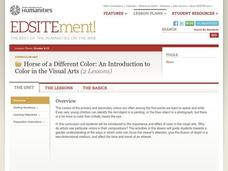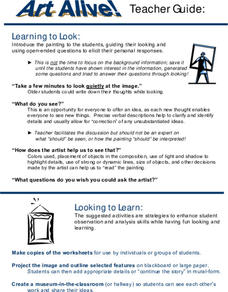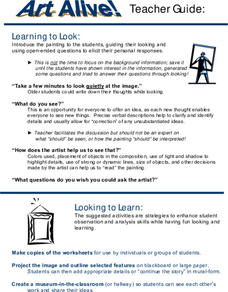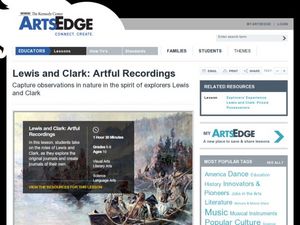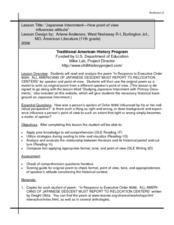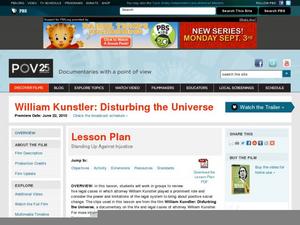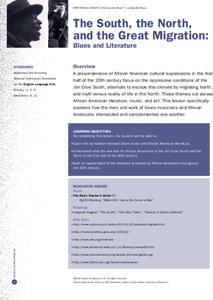Curated OER
"You're Probably Tired, Dear Diary" - Children's Diaries during the Holocaust
As part of the study of WWII and the Holocaust, class members read a series of diary entries written by children during the onslaught of Nazi occupation. Each entry is accompanied by biographical information and discussion questions. The...
Curated OER
Horse of a Different Color: An Introduction to Color in the Visual Arts
Students identify ways in which the artist uses color to draw the view's attention to points within the composition and creates a sense of depth. They discuss the effect of color on the tone and mood of an artwork.
Smithsonian Institution
The Soldier’s Experience—Vietnam versus World War I
The Vietnam War and World War I were two very important—and different—wars. To understand the differences, and similarities, class members watch videos, examine primary source documents, and then create a newscast that examines the...
Curated OER
Immigrating to America
Students study the American immigration experience. In this Ellis Island lesson, students research primary documents from the immigration station, take a tour of the station, and then prepare and perform dramatic presentations based on...
Curated OER
Whose History Is It Anyway? Patterns in History
Read and examine primary source material in order to analyze, synthesize, and debate information about the Great Depression. Critical analysts research various source materials related to the Great Depression. They work in teams to...
Curated OER
William Apess and the Mashpee "Revolt" of 1833
Prompt your class with the following question: What was the status of American Indians in Massachusetts during Jackson's presidency? To answer this question, class members will read a series of primary source documents (attached),...
Curated OER
The New England Fishing Industry:Sea Changes in a Community
Explore New England's economic and cultural past and possible issues New Englanders will face in the future. Middle and high schoolers research the fishing industry and the need for regulation. They analyze the topography of New England...
National Endowment for the Humanities
How to Win a World War
High schoolers are have begun to learn the art of diplomacy with each other, but do they understand how diplomacy works at a global level? The second in a series of four lessons, guides scholars in evaluating primary sources. The why...
Curated OER
Who Fought for the Union?
Learners read New York Times articles, letters, and listen to songs written from a soldier's perspective during the Civil War in order to understand who was fighting in the Union Army. This is a great lesson, complete with weblinks,...
Curated OER
The Poetry of Chinese Immigration
Numerous people from China immigrated to the US during the era of industrialization and expansion. Provide your class with a glimpse into the life of a Chinese immigrant through the poetry they left behind. They then compose a poem of...
Memorial Art Gallery
Art Alive! - Towing a Boat, Honfleur
Color, light and shadow, the placement and size of objects. These are some of the tools artists used to tell their stories. Model for learners how to read a painting by closely examining these features. The richly detailed packet...
Memorial Art Gallery
Art Alive! - Beach at Blue Point
And then what happened? Class members engage in a series of activities that model for them how to read the story in a painting. Participants respond to questions that ask them to closely examine the elements in William Glackens' "Beach...
Curated OER
The Great Gatsby: Primary Sources from the Roaring Twenties
Students research the Roaring Twenties. In this 1920's America lesson, students analyze primary sources to develop an understanding of lifestyles and values of the era as they read F. Scott Fitzgerald's The Great Gatsby.
Curated OER
Lewis and Clark: Artful Recordings
Young scholars examine the nature journals of Lewis and Clark. In this primary source analysis lesson, students research the journals that the members of the Corps of Discovery kept during the expedition and then conduct further research...
Curated OER
Nonviolence as a Tool for Change Lesson 1
Students examine voting rights in the South during the 1950s and 1960s. In this civil rights lesson, students examine legal rights and the opportunity to cast votes. Students research primary documents regarding the topic and share their...
Curated OER
Japanese Internment--How Point of View Influences Attitude
How does background and experience influence one's point of view? Dwight Okita's famous poem about the Japanese internment is the text used to explore this essential question. Class members study primary documents to gain the necessary...
Alabama Department of Archives and History
Strange Fruit: Lynching in America
To continue their study of the Civil War, Reconstruction, and the beginning of the civil rights movement, class members watch the YouTube video of Billie Holiday singing "Strange Fruit" as an introduction to an examination of lynching in...
PBS
Standing Up Against Injustice
“Sometimes things are lawful yet are actually wrong.” Researchers examine primary and secondary source materials as they study five legal cases involving civil rights attorney William Kunstler in which he attempted to use the legal...
Curated OER
About Life: The Photographs of Dorothea Lange Going to the Promised Land
To better understand the migrant experience during the Great Depression, pupils analyze two primary resources: photographs by Dorothea Lange and a U.S. Map that shows the Dust Bowl. They compare and contrast Lange's images to Steinbeck's...
National Woman's History Museum
How Do We Remember and Honor the Contributions of Women in Public Space?
Public art, especially monuments and memorials, are designed to celebrate and honor those who have made significant contributions to a community or even an entire nation. Here's a lesson plan that asks scholars to consider who is...
Curated OER
Henry VII - How Did Henry VII Get Up In the Morning?
Examine the daily life of Henry VII. In this Henry VII lesson, learners answer questions about the life in Medieval times after looking at primary source documents which are translated into contemporary English.
Captioned Media
Creating Dramatic Monologues from The Grapes of Wrath
Set in Oklahoma in the 1930s, The Grapes of Wrath presents a powerful view of life during the Great Depression. An insightful lesson plan takes a closer look at the characters in John Steinbeck's classic novel, combining the descriptions...
Curated OER
Introduction to Age of Absolutism
Who were the absolute monarchs of Europe and what effect did they have on their countries? Young historians begin by naming qualities they believe are important for a monarch to possess. They then take notes on four key factors leading...
Curated OER
The South, the North and the Great Migration: Blues and Literature
Here is a complex lesson plan that interweaves the history of the Jim Crow South and the Great Migration with the study of poetry, art, and blues music from the Harlem Renaissance. The plan helps young historians develop a deep...
Other popular searches
- Art Lessons Primary Penguins
- Edible Art Lessons Primary
- Art Lessons Primary Easter
- 3d Art Lessons Primary
- Art Lessons Primary Fruit
- Winter Art Lessons Primary
- Maori Art Lessons Primary
- Visual Art Lessons Primary
- Art Lessons Primary Tiger
- Art Lessons Primary Water
- Art Lessons Primary Victoria
- Art Lessons Primary Art



